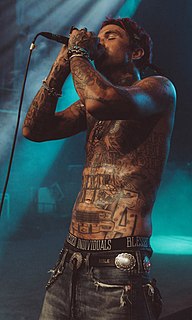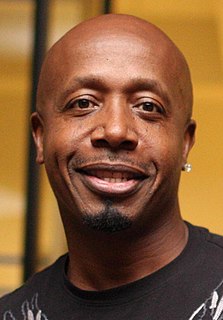A Quote by Lecrae
When you're part of hip-hop culture but you're a Christian, people want you to be either-or. Or they'll create a category for you, like, 'Oh, gospel rap!'
Related Quotes
In this time, we incorporate money and media, and it's split up like apartheid, where when you say "hip-hop," you think just rap records. People might have forgot about all the other elements in hip-hop. Now we're back out there again, trying to get people back to the fifth element, the knowledge. To know to respect the whole culture, especially to you radio stations that claim to be hip-hop and you're not, because if you was a hip-hop radio station, why do you just play one aspect of hip-hop and rap, which is gangsta rap?
To me, that's the biggest problem with hip-hop today is the fact that everyone believes that all of hip-hop is rap music, and that, when you say "hip-hop," it's synonymous with rap. That when you say "hip-hop," you should be thinking about breakdancing, graffiti art, or MCing - which is the proper name for rap - DJing, beat-boxing, language, fashion, knowledge, trade. You should be thinking about a culture when you say, "hip-hop.".
If I were to critique myself - step out of KRS objectively and look at him - I would say that KRS has introduced the concept of being hip-hop, not just doing it. The concept of rap as something we do, while hip-hop is something we live. The concept of living a culture. Don't just look at hip-hop as rap music, see it as a culture.
I think that hip-hop should be spelled with a capital "H," and as one word. It's the name of the culture, and it's the name of the identity and consciousness. I think hip-hop is not a product, but a culture. I think rap is a product, but when hip-hop becomes a product, that's slavery, because you're talking about people's souls.
I think that hip-hop should be spelled with a capital "H," and as one word. It's the name of our black people culture, and it's the name of our identity and consciousness. I think hip-hop is not a product, but a culture. I think rap is a product, but when hip-hop becomes a product, that's slavery, because you're talking about people's souls. To me, that's the biggest problem.
Well, we have to realize the truth about the person who is a hip-hop insider. Most of these people are not really insiders. They are people who are chosen to do an interview and they will make a statement and say that they are a part of the hip-hop culture, but from an intellectual standpoint, they are not very sharp, because back in '1990..'91 one would criticize somebody for doing one type of commercial and say that's not real hip-hop and then another rapper turns around and sell them malt liquor and say that's real hip hop.
A lot of the commercial expression of hip-hop leaves a lot to be desired - but then, there's a lot of whack gospel music, but I'm not leading a crusade against it. Of course, the vices of hip-hop are far more influential, I understand. But the good that hip-hop transmits, the power of the culture to rally the best of our protest, and uplift, and resistance, traditions, is often unfairly overlooked.
I think that all journalists, specifically print journalists, have a responsibility to educate the public. When you handle a culture's intellectual property, like journalists do, you have a responsibility not to tear it down, but to raise it up. The depiction of rap and of hip-hop culture in the media is one that needs more of a responsible approach from journalists. We need more 30-year-old journalists. We need more journalists who have children, who have families and wives or husbands, those kinds of journalists. And then you'll get a different depiction of hip-hop and rap music.
I've been able to be a part of every movement in music over the last several decades. The only one that I haven't been involved in so much is hip-hop, which I chose not to be involved in because it felt like I would be what they called "perpetrating." It felt like hip-hop was so much of its own culture and that I was not part of that culture.
Socially, hip-hop has done more for racial camaraderie in this country than any one thing. 'Cause guys like me, my kids - everyone under 45 either grew up loving hip-hop or hating hip-hop, but everyone under 45 grew up very aware of hip-hop. So when you're a white kid and you're listening to this music and you're being exposed to it every day on MTV, black people become less frightening. This is just a reality. What hip-hop has done bringing people together is enormous.
I am trying to get folks outside the hip-hop culture to understand why, despite the negatives, young people find hope and refuge in hip-hop. I'm hoping that young people immersed in the culture will work harder to capitalize on the possibilities for great social change that hip-hop represents as a national unified cultural youth movement.





























